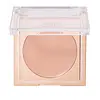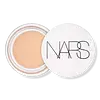What's inside
What's inside
 Key Ingredients
Key Ingredients

 Benefits
Benefits

 Concerns
Concerns

 Ingredients Side-by-side
Ingredients Side-by-side

Ricinus Communis Seed Oil
MaskingOctyldodecyl Stearoyl Stearate
EmollientBis-Diglyceryl Polyacyladipate-2
EmollientRhus Verniciflua Peel Wax
Rhus Succedanea Fruit Wax
Methyl Methacrylate Crosspolymer
Tribehenin
EmollientTocopherol
AntioxidantTocopheryl Acetate
AntioxidantGlycyrrhiza Glabra Root Extract
BleachingMicrocrystalline Wax
Emulsion StabilisingKaolin
AbrasiveTetrahexyldecyl Ascorbate
AntioxidantSilica
AbrasiveMontmorillonite
AbsorbentMagnesium Aluminum Silicate
AbsorbentCaffeine
Skin ConditioningSqualane
EmollientPolyethylene
AbrasiveEthylhexyl Palmitate
EmollientAtelocollagen
Skin ConditioningButylene Glycol
HumectantMica
Cosmetic ColorantPentaerythrityl Tetraisostearate
EmollientSilica Dimethyl Silylate
EmollientSodium Chondroitin Sulfate
Skin ConditioningSodium Hyaluronate
HumectantAscorbyl Palmitate
AntioxidantCaprylyl Glycol
EmollientPhenoxyethanol
PreservativeIron Oxides
CI 77891
Cosmetic ColorantRicinus Communis Seed Oil, Octyldodecyl Stearoyl Stearate, Bis-Diglyceryl Polyacyladipate-2, Rhus Verniciflua Peel Wax, Rhus Succedanea Fruit Wax, Methyl Methacrylate Crosspolymer, Tribehenin, Tocopherol, Tocopheryl Acetate, Glycyrrhiza Glabra Root Extract, Microcrystalline Wax, Kaolin, Tetrahexyldecyl Ascorbate, Silica, Montmorillonite, Magnesium Aluminum Silicate, Caffeine, Squalane, Polyethylene, Ethylhexyl Palmitate, Atelocollagen, Butylene Glycol, Mica, Pentaerythrityl Tetraisostearate, Silica Dimethyl Silylate, Sodium Chondroitin Sulfate, Sodium Hyaluronate, Ascorbyl Palmitate, Caprylyl Glycol, Phenoxyethanol, Iron Oxides, CI 77891
Polyglyceryl-2 Triisostearate
EmulsifyingOctyldodecanol
EmollientKaolin
AbrasivePolybutene
Mica
Cosmetic ColorantPolyethylene
AbrasiveCaprylic/Capric Triglyceride
MaskingBidens Pilosa Extract
HumectantIsopropyl Titanium Triisostearate
EmollientStearalkonium Hectorite
Gel FormingPropylene Carbonate
SolventAstrocaryum Murumuru Seed Butter
EmollientGossypium Herbaceum Seed Oil
Skin ConditioningLinum Usitatissimum Seed Oil
PerfumingTocopherol
AntioxidantTrihydroxystearin
Skin ConditioningEthylhexyl Palmitate
EmollientSilica Dimethyl Silylate
EmollientButylene Glycol
HumectantSodium Hyaluronate
HumectantCaprylyl Glycol
EmollientHexylene Glycol
EmulsifyingTocopheryl Acetate
AntioxidantLecithin
EmollientPhenoxyethanol
PreservativeCI 77163
Cosmetic ColorantIron Oxides
CI 77891
Cosmetic ColorantPolyglyceryl-2 Triisostearate, Octyldodecanol, Kaolin, Polybutene, Mica, Polyethylene, Caprylic/Capric Triglyceride, Bidens Pilosa Extract, Isopropyl Titanium Triisostearate, Stearalkonium Hectorite, Propylene Carbonate, Astrocaryum Murumuru Seed Butter, Gossypium Herbaceum Seed Oil, Linum Usitatissimum Seed Oil, Tocopherol, Trihydroxystearin, Ethylhexyl Palmitate, Silica Dimethyl Silylate, Butylene Glycol, Sodium Hyaluronate, Caprylyl Glycol, Hexylene Glycol, Tocopheryl Acetate, Lecithin, Phenoxyethanol, CI 77163, Iron Oxides, CI 77891
Ingredients Explained
These ingredients are found in both products.
Ingredients higher up in an ingredient list are typically present in a larger amount.
Butylene Glycol (or BG) is used within cosmetic products for a few different reasons:
Overall, Butylene Glycol is a safe and well-rounded ingredient that works well with other ingredients.
Though this ingredient works well with most skin types, some people with sensitive skin may experience a reaction such as allergic rashes, closed comedones, or itchiness.
Learn more about Butylene GlycolCaprylyl Glycol is a humectant and emollient, meaning it attracts and preserves moisture.
It is a common ingredient in many products, especially those designed to hydrate skin. The primary benefits are retaining moisture, skin softening, and promoting a healthy skin barrier.
Though Caprylyl Glycol is an alcohol derived from fatty acids, it is not the kind that can dry out skin.
This ingredient is also used as a preservative to extend the life of products. It has slight antimicrobial properties.
Learn more about Caprylyl GlycolCi 77891 is a white pigment from Titanium dioxide. It is naturally found in minerals such as rutile and ilmenite.
It's main function is to add a white color to cosmetics. It can also be mixed with other colors to create different shades.
Ci 77891 is commonly found in sunscreens due to its ability to block UV rays.
Learn more about CI 77891Ethylhexyl Palmitate, also known as octyl palmitate, is created from 2-ethylhexyl alcohol and palmitic acid. It is a fatty acid ester.
The fatty acid content of Ethylhexyl Palmitate makes it an emollient. Emollients help soften and hydrate your skin by trapping moisture within.
Ethylhexyl Palmitate is also used to help improve the texture of cosmetics. It helps other ingredient dissolve in products and help disperse ingredients more evenly.
You'll likely find this ingredient in sunscreen, as it is often used to mix UV-blocking ingredients such as avobenzone and ethylhexyl triazone.
It can also help stabilize the fragrances in a product as a fragrance fixative.
Ethylhexyl Palmitate can be used to substitute mineral oil.
Due to its high fatty acid content, it may not be fungal-acne safe.
Learn more about Ethylhexyl PalmitateKaolin is a clay. It is used for oil control and to help minimize pores. Like other clays, kaolin has the ability to absorb excess sebum or oil. This can help clean out pores and mattify the skin.
Some types of kaolin may have exfoliating properties. When water is added to kaolin, it becomes a paste with small abrasive particles.
Most kaolin is a white color, but may be pink/orange/red depending on where it comes from.
The name 'kaolin' comes from a Chinese village named 'Gaoling'. Kaolin clay comes from rocks rich in kaolinite. Kaolinite, the mineral, has a silicate layered structure. Kaolinite is formed from chemical weathering of aluminum siilicate minerals.
Besides skincare, kaolin is commonly used to make glossy paper, in ceramics, toothpaste, and as medicine to soothe stomach issues.
Learn more about KaolinMica is a naturally occurring mineral used to add shimmer and color in cosmetics. It can also help improve the texture of a product or give it an opaque, white/silver color.
Serecite is the name for very fine but ragged grains of mica.
This ingredient is often coated with metal oxides like titanium dioxide. Trace amounts of heavy metals may be found in mica, but these metals are not harmful in our personal products.
Mica has been used since prehistoric times throughout the world. Ancient Egyptian, Indian, Greek, Roman, Aztec, and Chinese civilizations have used mica.
Learn more about MicaPhenoxyethanol is a preservative that has germicide, antimicrobial, and aromatic properties. Studies show that phenoxyethanol can prevent microbial growth. By itself, it has a scent that is similar to that of a rose.
It's often used in formulations along with Caprylyl Glycol to preserve the shelf life of products.
Polyethylene is a synthetic ingredient that helps the skin retain moisture. It is a polymer.
It is also typically used within product formulations to help bind solid ingredients together and thicken oil-based ingredients. When added to balms and emulsions, it helps increase the melting point temperature.
This silica is mainly used to thicken oils and suspend particles in oils. It is not water soluble.
According to the manufacturer, it:
The manufacturer also claims this ingredient to be useful in makeup.
In lipstick formulations, this ingredient improves color payoff, reduces pigment settling, and reduces oil bleeding. This ingredient also improves the grip of powder products such as dry shampoos.
Learn more about Silica Dimethyl SilylateSodium Hyaluronate is hyaluronic acid's salt form. It is commonly derived from the sodium salt of hyaluronic acid.
Like hyaluronic acid, it is great at holding water and acts as a humectant. This makes it a great skin hydrating ingredient.
Sodium Hyaluronate is naturally occurring in our bodies and is mostly found in eye fluid and joints.
These are some other common types of Hyaluronic Acid:
Learn more about Sodium HyaluronateTocopherol (also known as Vitamin E) is a common antioxidant used to help protect the skin from free-radicals and strengthen the skin barrier. It's also fat soluble - this means our skin is great at absorbing it.
Vitamin E also helps keep your natural skin lipids healthy. Your lipid skin barrier naturally consists of lipids, ceramides, and fatty acids. Vitamin E offers extra protection for your skin’s lipid barrier, keeping your skin healthy and nourished.
Another benefit is a bit of UV protection. Vitamin E helps reduce the damage caused by UVB rays. (It should not replace your sunscreen). Combining it with Vitamin C can decrease sunburned cells and hyperpigmentation after UV exposure.
You might have noticed Vitamin E + C often paired together. This is because it is great at stabilizing Vitamin C. Using the two together helps increase the effectiveness of both ingredients.
There are often claims that Vitamin E can reduce/prevent scarring, but these claims haven't been confirmed by scientific research.
Learn more about TocopherolTocopheryl Acetate is AKA Vitamin E. It is an antioxidant and protects your skin from free radicals. Free radicals damage the skin by breaking down collagen.
One study found using Tocopheryl Acetate with Vitamin C decreased the number of sunburned cells.
Tocopheryl Acetate is commonly found in both skincare and dietary supplements.
Learn more about Tocopheryl AcetateThis ingredient is a combination of red, black, and yellow iron oxide pigments. This combination of colors is usually found in foundation, because it results in a "skin" color.